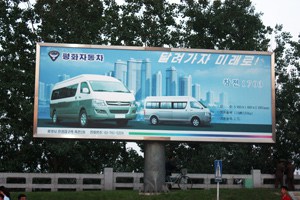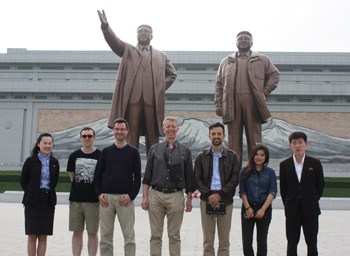By Gordon Leonard, business tutor and manager of international university programmes
I have experienced some cultural challenges teaching at Universities in China – but what can really prepare me for this. I was going to be delivering a workshop to North Koreans about tourism business models and I had no idea what to expect and how my session was going to be received.
Sitting in my hotel room on my first night in Pyongyang, I realised not everything I could say or do here might be understood in the way I intended.
All I knew was that the DPRK (the Democratic People’s Republic of Korea, the name you are expected to use while in country) was permitting small groups of foreign experts to give business and entrepreneurship workshops in the country and this could be arranged with an organisation called ‘Choson Exchange’ (Choson being the Korean word the DPRK prefers to call itself).
As the day of my session was approaching, the good news was that our DPRK liaison staff were very approachable and much younger than I expected. Having discussions about favourite movies and songs reminded me of similar conversations I had when I first arrived in China.

Pyongyang advertising
I can’t say I like many of the Disney songs but they certainly provided a handy reference point for us all to understand each other more. This closeness with our liaison team and the ability to stroll to our evening meals with them through some of the main streets in Pyongyang at night really set us apart from most visitors to the city.
Being based in the Pyongyang Hotel, I felt connected to the city seeing the morning and evening rush for trolley buses outside my hotel room. In fact, you could also see one of a handful of advertising billboards in the whole city on the road opposite our hotel – it was for a Hi-Ace type van!
Another interesting aspect of my location was meeting the only practicing foreign lawyer specialising in commercial law for foreign entities in the DPRK at the time. What’s more, being both alumni of the University of Edinburgh, there was a great connection from the start leading to a few late nights chatting.
Less than two months after my trip though, Hay, Kalb & Associates announced they were to suspend their Pyongyang operations, but still maintain a presence in the DPRK. Part of their statement read that they took the decision “after lengthy and thorough deliberation and an examination of the continuing deterioration of inter-regional relations pertaining to the Korean peninsula”. Mentioning the effect of sanctions, the statement continued, “Sanctions are hurting legitimate foreign investors. There still is no credible, consistent evidence I see of DPRK companies hurting.”
INTERNATIONAL VISITORS
Apart from meeting expat diplomats and business people, a formal meeting was also arranged for our group to hear about the development plans for the Wonsan Special Region on the east coast. We saw with our own eyes the great potential the coastal town has with regards to beachside tourism and were impressed to hear that plans are afoot to expand current hotel capacity by 10 times in the coming years with a growing emphasis on domestic tourism initially before bringing in international visitors.
To create a buzz about the region, the first Wonsan International Airshow will take place in late September 2016 at the newly constructed Kalma International Airport.
GIRL POWER

The group of tutors
On the day of the workshop, I have to say there were quite a few unexpected and pleasant surprises: I was the first person up on the first day of our group of four, so it was my job to ‘loosen up’ the crowd. The format of the session was more like a traditional lecture session with much less ‘chunking’ of material than I am used to doing with undergraduate students.
The crowd was polite and respectful, but it was hard for me to gauge how much of the material was sinking in, especially with simultaneous translation. The good news was that when I requested the participants to complete their own business model canvases, they, on the whole, produced very good work.
On day two, one of the workshop leaders sadly was ill, but this allowed me more time to feedback on the work submitted and for prizes to be awarded to the very best ones. It was very difficult to choose winners, but in the end three prizes went out to three female participants, who were actually in the minority of attendees. Girl power DPRK style, I think!
I was also fascinated to hear from a gentleman from one of the new tourism development regions on how he has changed his perspective from being essentially producer-led to more consumer-led in how they develop their projects in recent years. This shows me that in some ways the DPRK is indeed going through somewhat of an upgrade in terms of how they approach business matters, and also on how they are looking to interact more with the outside world and take on useful advice, which aids their development.
I was also very happy to receive criticism from a participant who thought I spent too little time on cost structure and revenue streams. This was indeed a valid complaint, so I was able to run a small sideline session with those interested in more practical examples on how they could use the information to integrate into a basic budget. I indeed had to work hard for the privilege of giving a session in the Grand People’s Study Hall, but I was loving it.
THE LITTLE THINGS
One of the nicest experiences we had was on our last full day in Pyongyang, where we went for a top-class lunch in a dining complex (complete with high-end coffee bar). The founder was a participant on one of the early entrepreneurship workshops run in the DPRK and had been so motivated to begin her own business journey.
Having gauged the impact engagement with the outside world has had on China’s development first-hand, I am trying to be an optimist and to continually challenge my old assumptions about the world
We were fortunate to see the fruit of her labour, and her team laid out a spread of off-the-menu delicacies. As anyone in business says, it’s the small details that matter, and as we were about get in our bus for the rest of the sightseeing, trays of excellent iced coffees were dispensed to all of our party. It is very heartening to see first-hand the impact a simple workshop can have on an individual, and the changes they can then go on to make in their career and life wherever they are in the world.
INTO THE UNKNOWN
I am sure there are those of you who think that I may have been deceived or tricked into believing that the DPRK doesn’t have any faults or problems, but you would be wrong. Having gauged the impact engagement with the outside world has had on China’s development first-hand, I am trying to be an optimist and to continually challenge my old assumptions about the world.
As a tutor who delivers modules on entrepreneurship, we continually expect students to take a leap into the unknown with their projects – I would be a hypocrite if I didn’t attempt new challenges of my own with the risks that they entail.
One useful read on the DPRK that helped me gain an updated understanding of the changes (and areas not changing) that are afoot was North Korea Confidential by Daniel Tudor and James Pearson. I would recommend it as a starting point to get past the dated or lazy journalism that seems to inhabit the sphere.
As a Nottingham Business School DBA student writing about business networks for my research, the DPRK is indeed connected to the one network we are all part of – the global network – and it is through engagement in it that we build trust and reciprocity between individuals.
If you are looking for a new challenge, I would encourage you to get in touch about the upcoming workshops running in late 2016.
For more information on Choson Exchange and upcoming workshops taking place in the DPRK, click here.
Photo (main): Jen Morgan

Pyongyang skyline. Photo: Clay Gilliland
About the blogger
Gordon Leonard is an experienced award-winning business tutor and manager of international university programmes.
He is currently enrolled as a DBA student with Nottingham Business School, conducting research on international entrepreneurship and entrepreneurship in China.
Gordon is a China resident of over 10 years, residing in Chengdu, a city in the south-west of the country.
You can contact Gordon via email here.



